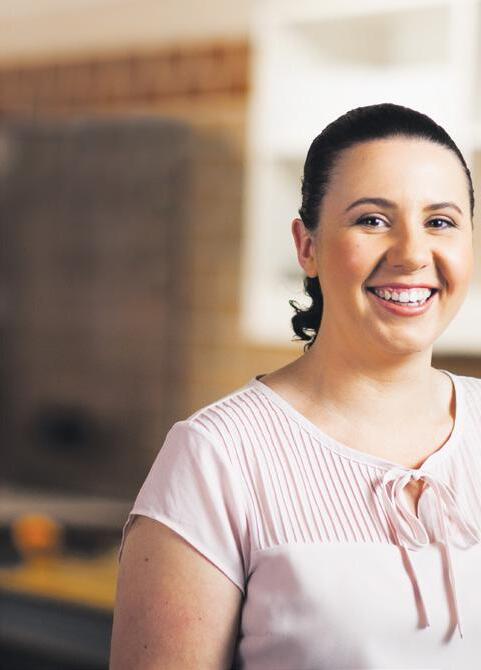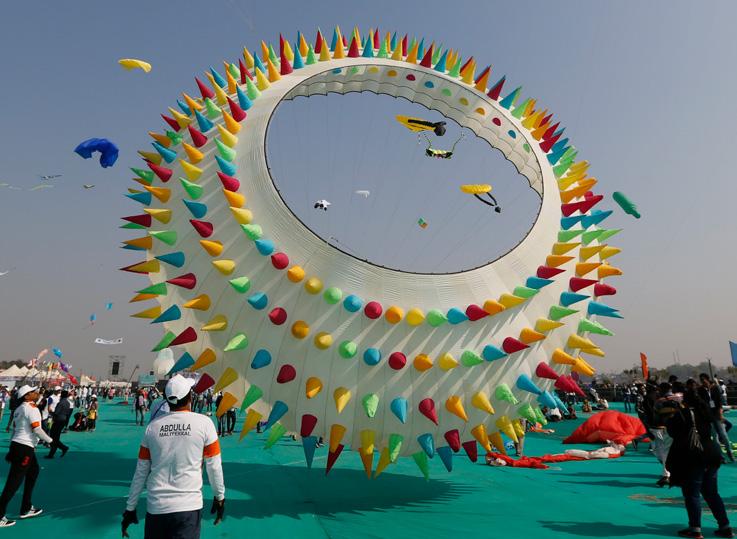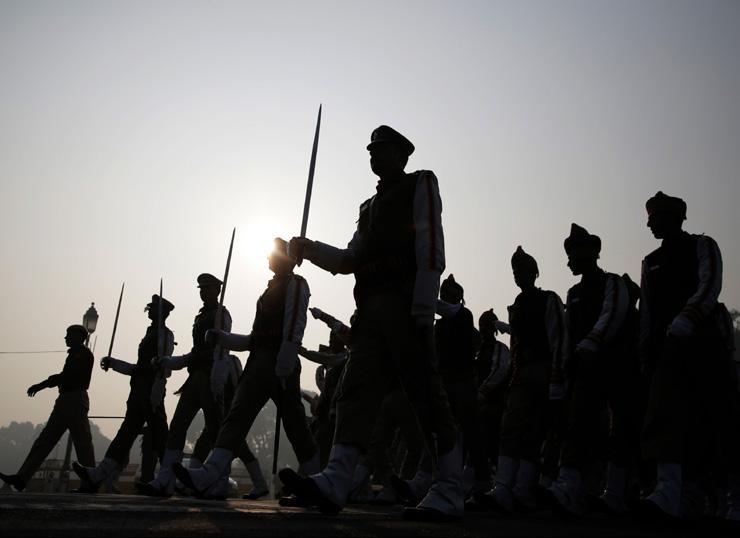
14 minute read
WHAT’S ON
from 2018-01 Sydney (1)
by Indian Link
Republic Day
Flag hoisting at Consulate
Fri 26 Jan (9:30am-11:00am) On the occasion of the 69th Republic Day of India, a ag hoisting ceremony would be held on Friday, 26th January, 2018 at Consulate General of India, Sydney. The programme includes ag hoisting ceremony, singing of the national anthem, reading of the speech of the Hon’ble President of India by Consul General and cultural programmes. Members of Indian community and friends of India are invited to take part in the ag hoisting ceremony. Refreshments will be served after the ceremony. Consulate General of India, Level 2, 265, Castlereagh Street, Sydney. Details 02 9223 2702
COMMUNITY
Kite Fun and Family Festival-2018
Sun 14 January (9:30am-6pm)
Shree Swaminarayan Mandir Blacktown’s Kite Fun and Family Festival. Fair eld Showground, 463 Smith eld Road, Smith eld. Details 02 8897 2949
POETRY
Guftagu with Gulzar Sahab
Sat 27 Jan (5:30pm to 9:30pm)
An unforgettable evening with the celebrated poet, lyricist and director Gulzar. Sir John Clancy Auditorium, UNSW, 9 High Street, Kensington.
Details Arun Nanda 0401 230 046
Spiritual
Bhajan Kirtan
Sun 28 Jan (4:00pm-6:30pm)
An event by Shri Shiva Mandir in association with ISKCON Hare Krishna South West Sydney. Krishna Bhajans by Sripati Prabhuji. Discourse on Bhagvat Geeta by Achal Krsna Prabhuji. Details 0421 376 384
Swami Vivekananda birthday celebration
Sun 14 Jan (from 10.30am, concludes with lunch) Spiritual music, silent meditation, Vedic chants, live music by sarod player Tanim Hayat Khan Rajit, panel discussion on ‘Exploring: Swami Vivekananda in the Media, Then and Now’ With Fred Schnerring, Uma Srinivasan & Robert Grant, talk by Pravrajika Gayatriprana. Vedanta Hall, 15 Liverpool Road, Croydon. Details 0408 029 336
FESTIVAL
Pongal celebration
Sat 20 Jan (9:00am to 5:00pm)
An event by Sydney Tamil Mandram. Seven Hills West Public School, Sackville Street
Details Indu 0448 697 948
Holifest (Festival of Colours)
Sun 25 Feb (11am-4pm) Apart from colours, this multicultural festival will also feature live on stage performances, food stalls, children’s fun rides and entertainment
New Batch of Yoga
activities, non-stop music and heaps of entertainment. Castle Hill Showground, Doran Dr, Castle Hill.
Details 1300 338 368
Holi Mahotsav
Sat 14 April 10:00am to Sun 15
April 7:00pm Tumbalong Park, Pier St, Sydney, Australia 2000. Details: www.holimahotsav.com.au
Rockdale colour festival
Sat 3 March 11:00am to Sun 4
March 9:00pm Rockdale Bicentennial Park, West Botany St, Rockdale. Details kameroevents.com.au
Holi Mela Parramatta
Sun 4 March (11:00am-5:00pm)
Between Wilde Avenue and Queen Street, Parramatta. Details Anuj Kulshretra 0426 155 227
YOGA
Free Yoga with Divine Life Society (Tuesdays 7pm) Swami Uditramanandaji of The Divine Life Society of Australia offers free Yoga classes every Tuesday from 7.00pm8.15pm at Strath eld Girls High School. All levels of tness welcomed. Entrance via Oxford Rd. Details Karo 0413 535 157.
Yoga: The way of life (Saturdays 8am; Wednesdays 7pm) A retreat for body, mind and soul, join weekly yoga sessions at Glenwood Public School (Saturdays) or Moorebank Community
Starting from 20th Jan 2018 For Update visit www.spiritofindia.org Not
Centre (Wednesdays). Details Meera 0433 125 708.
Spirit of India Yoga (Saturdays and Sundays) Yoga classes are held in Ryde, Wentworthville, Quakers Hill and Epping. All levels incl. beginners, senior citizens, children. To enrol in this 15 week course email spirito ndia2002@yahoo.com, visit www.spirito ndia.org.au or contact Suresh 0412 202 182
LANGUAGE
Hindi Classes
Saturdays 2.30pm to 4.30pm Located at the Indian Cultural Centre, Level 1, 265 Castlereagh St, Sydney. Hindi classes are $5 per one hour class or $40 for ten classes. Registration is essential as there is a maximum of 20 people per class. Paid parking is available in the vicinity. Details email icc2.sydney@mea.gov.in
BSK/SVP classes, Saturdays A local initiative of VHP Australia, Bala Samskar Kendra (BSK) holds weekly Sanskrit language lessons as well as a culture and heritage program at Oran Park School, 390 South Circuit, Oran Park. Details Akila 0450 117 372.
To list your event email: media@indianlink.com.au
Come First Serve Basis
Wentworthville



National anthem no longer must in cinema halls: Supreme Court
Modifying its earlier order, the Supreme Court on 9 January said playing the national anthem before screening movies in cinema halls was no longer mandatory.
The ruling by a bench of Chief Justice Dipak Misra, Justice AM Khanwilkar and Justice DY Chandrachud followed an order of November 2016 when an apex court bench, including Justice Misra, had made the playing of the national anthem compulsory in cinema halls before movies are screened.
However, the court also made it clear that where the anthem is played, people must stand up in respect. Physically challenged and senior citizens who cannot stand up may be exempted from this, it said.
The central government told the top court that it has set up an inter-ministerial committee to frame guidelines to decide the circumstances and occasions when the national anthem should be played or sung with decorum and suggested that the earlier order could be reviewed.

Attorney General K.K. Venugopal urged the court to modify its 2016 order substituting “shall” with “may” for the playing of the national anthem in cinema halls.
The top court by its 30 November, 2016, order making mandatory the playing of national anthem in cinema halls before the start of movies described the national anthems as a “symbol of the Constitutional patriotism and inherent national quality.”
It had said “...it is the sacred obligation of every citizen to abide by the ideals engrafted in the Constitution. And one such ideal is to show respect for the National Anthem and the National Flag.”
Seeking to put on hold the 30 November, 2016, order mandating the playing of national anthem in cinema halls before the start of the film, the government in its affidavit filed on 8 January told the court that the inter-ministerial committee would examine all aspects of the playing and singing of national anthem and would submit its report within six months.
The government had told the court that the 11-member inter-ministerial committee, set up on 5 December, 2017, would require extensive discussions on wide-ranging issues.
The government said the committee has been set up to look into all aspects relating to the playing or singing of the national anthem.
After considering the recommendation of the committee, the government may bring out notification or circular or rules to enforce them, the court was told.
The 2016 order had said that all viewers in the cinema halls should stand up when the national anthem was played.
Disposing of the petition by Shyam Narayan Chouksey, the court allowed him and other petitioners to make representations and suggestions to the interministerial committee.
Naidu calls for global consensus to fight terrorism
Vice President M Venkaiah Naidu called for a global consensus to fight terrorism and criticised those who are supporting the global menace in the name of religion.
Naidu also sought support of over three crore Persons of Indian Origin (PIO) across the world in building a “New India.”
“The biggest challenge to world order today is terrorism and we must build a global consensus to fight the menace,” Naidu said in the valedictory session of the first-ever PIOParliamentarians Conference here.
The Vice President said, “All of us must recognise terrorism as a threat to humanity and take concerted action to curb it.”
“Unfortunately, some people are clothing terror in the garb of religion, but in fact, terrorism has no basis in any religion of the world,” he said.
Naidu said the Indian diaspora, the secondlargest such community in the world, “has contributed enormously to strengthening India’s cultural, literary, political and economic bonding across the world”.
Citing an example of a squirrel, who participated in making of a bridge across the sea for Lord Ram to reach Lanka, the Vice President urged the PIOs to contribute in “an appropriate manner to the ongoing efforts to build a New India.”
Naidu asserted that the success of Indian diaspora in different parts of the world was a clear reflection of the strength of the Indian values of assimilation and inclusivity.
“The presence of such a large number of elected representatives of Indian origin in legislatures of such a large number of countries from across the world goes beyond the symbolism of the expanding horizons of the influence of India in the global scheme of things,” he said.
The Vice President noted, “When we talk of Indian Nationalism, we refer to the pride that is associated with such inclusive humanism, which is native to this land. Some deviant words and deeds of some misguided persons can in no way dent the quality and strength of the core values of our motherland.”
He asserted that while the citizens took pride in the spirit of Indian nationalism that unites the people of different social and religious hues cohabiting in the country, “PIOs imbibe and uphold the ethos and values of those countries which again is a manifestation of the spirit of assimilation, which is at the heart of core Indian values.”
In all, 143 PIOs from 24 countries participated in the event organised here at Pravasi Bharatiya Bhavan.
External Affairs Minister Sushma Swaraj said the conference will help in opening new vistas for regular dialogue and exchange of views.
“I am confident that this historical conference will help open new vistas for regular dialogues and exchange of visits and views of PIO parliamentarians,” she said, adding global Indians had become India’s friends currently because of the several successful initiatives launched by the government to connect with Indian diaspora.
“In times of crisis in abroad, the Indian government has launched several rescue missions too.”
She said that the current government has one mission to remake India into a great nation and the “mission in which every Indian and equally every overseas Indian arrive at equal fate.”
“The government of India under the dynamic leadership of Prime Minister Narendra Modi has been especially proactive in making bonds with Indian diaspora,” she said.
Relief for Indians as US says no change in H-1B visa extension policy
Indian techies in the US can heave a sigh of relief after the Trump administration said it was not considering any regulatory change that will force H1-B visa holders to leave the country.
The announcement by the US Citizenship and Immigration Services (USCIS) came after last week’s report by US-based news agency McClatchy DC Bureau that Washington was considering new regulations to prevent the extension of H-1B visas, largely availed of by Indian IT firms.
“The USCIS is not considering a regulatory change that would force H-1B visa holders to leave the US by changing our interpretation of section 104(c) of AC-21, which provides for H-1B extensions beyond the 6 year limit,” said Jonathan Withington, chief of media relations for USCIS.
“Even if it were, such a change would not likely result in these H-1B visa holders having to leave the US because employers could request extensions in one-year increments under section 106(a)-(b) of AC21 instead,” Withington was quoted as saying by Kansas City Star
“The agency is considering a number of policy and regulatory changes to carry out the President’s Buy American, Hire American Executive Order, including a thorough review of employment based visa programmes,” he said.
Earlier reports said the Trump administration was considering tightening H-1B visa rules that could lead to deportation of 750,000 Indians.
Withington said that USCIS was never considering such a policy change and that “any suggestion that USCIS changed its position because of pressure is absolutely false.”
Representatives Kevin Yoder, a Kansas Republican, and Tulsi Gabbard, a Democrat from Hawaii, sent a letter to Trump, obtained by McClatchy, urging him “not to deport H-1B holders awaiting permanent residency processing.”
“We strongly believe this action would be harmful to the American economy, credibility and relations with India and the Indian-American community,” wrote Yoder and Gabbard last week. Both are members of the Congressional Caucus on India and Indian Americans.
The US Chamber of Commerce had warned it would be “tremendously bad policy” to tell highly skilled people they were not welcome to stay in the US.
The H-1B programme offers temporary
US visas that allow companies to hire highly skilled foreign professionals working in areas with shortages of qualified American workers.
Indians get most of the H1-B visas, although there are no national quotas for the facility nor is it specifically designed for Indians.
Since taking office, the Trump administration has been talking about cracking down on the visa scheme.
The Indian IT industry also lauded the US administration for not considering any regulatory change in the H-1B visa extension policy.
“It’s a good decision. We are relieved that there won’t be any change in the H1-B visa extension policy. It is beneficial for us as well as our clients in the US,” a software export firm executive said.
“Raising the visa issue has been a regular feature in the US media and rhetorical among the lobbies despite the fact that there is an acute shortage of skilled professionals in North America and enterprises there need those who have them (skills),” said another IT firm executive on the condition of anonymity.
With internet and communication technologies bridging the space and distance, the need for deploying more techies on onsite has reduced drastically over the years.
“We do more projects from offshore (India) and provide a range of software services remotely through seamless networks. The need for deploying more of our employees is not so much as it was in the past,” added the executive.
According to Nasscom estimates, the use of visas by Indian IT firms has declined 50 per cent over the last two years.
Modi to address plenary at Davos World Economic Forum
This year’s World Economic Forum (WEF) at Davos will have the first Indian Prime Minister participating since 1997, with Narendra Modi slated to address the plenary session of the prestigious global business meet, Commerce Minister Suresh Prabhu announced on 9 January.
According to the Commerce Ministry, WEF 2018, to be held over January 2326, will be attended by 350 political leaders, including over 60 heads of state or government, and CEOs of the world’s major companies.
“The Prime Minister is going to attend the World Economic Forum for the first time, at a time when the whole world is looking to India,” Prabhu told the media here.
“The WEF is the single most important gathering of business leaders and bankers of the world... virtually, it is a global decision making place. The Chinese president’s visit there last year created a big buzz,” he added.
While Modi is slated to address the inaugural plenary session on January 23, he is to be followed by an impressive array of Indian ministers who will take part in various group sessions.
Besides Prabhu, they include Finance Minister Arun Jaitley, Railways Minister
Piyush Goyal and Petroleum Minister Dharmendra Pradhan as well as the respective Ministers of State in the PMO Jitendra Singh and for the External Affairs Ministry MJ Akbar, a Commerce Ministry release said.
Prabhu also said that two statesAndhra Pradesh and Maharashtra - will be represented at Davos through their Chief Ministers Chandrababu Naidu and Devendra Fadnavis, respectively.
Department of Industrial Policy and Promotion (DIPP) Secretary Ramesh Abhishek said that Modi is also scheduled to interact with top business leaders in Davos at the meeting of the International Business Council consisting of 120 top chief executives of major multinationals.
The theme of AWEF 2018 is “Creating a Shared Future in a Fractured World,” the statement said.
According to observers here, Modi’s first visit to WEF is an opportunity to interact with foreign investors following the implementation of the major structural reform of the Goods and Services Tax (GST), as well as the demonetisation measure of November 2016.
Prabhu said that he would be taking part in a mini-ministerial of trade ministers at Davos, which assumes significance following the deadlock at the World Trade Organisation’s ministerial held last month in Buenos Aires on the issue of public food stockholding.
Government restricts use of national flag made of plastic
The central government urged everyone not to use a national flag made of plastic and asked the states and union territories to ensure strict compliance of the Flag Code in view of the Republic Day celebration ahead.
An advisory from the Union Home Ministry said that that the “national flag represents the hopes and aspirations of the people of the country and hence should occupy a position of honour,” but since plastic flags are not biodegradable like paper flags, these do not get decomposed for a long time and ensuring appropriate disposal of a national flag made of plastic, commensurate with dignity of the flag, is a practical problem.
As per Section 2 of The Prevention of Insults to National Honour Act, 1971, whoever in any public place or in any other place within public view burns, mutilates, defaces, defiles, disfigures, destroys, tramples upon or otherwise shows disrespect to or brings into contempt (whether by words, either spoken or written, or by acts) the Indian National Flag or any part thereof, shall be punished with imprisonment for a term which may extend to three years, or with fine, or with both.
The advisory said that on important national, cultural and sports events, flags made of paper only are to be used by public in terms of the provisions of the Flag Code of India, 2002 and such paper flags are not to be discarded or thrown on the ground after the event.

Such flags are to be disposed of, in private, consistent with the dignity of the flag.
Indian-origin chemist discovers new recipe for early life
A team of chemists led by an Indian-origin researcher at The Scripps Research Institute (TSRI) have developed a fascinating new theory for how life on Earth may have begun.
The experiments demonstrate that key chemical reactions that support life today could have been carried out with ingredients likely present on the planet four billion years ago.
“This was a black box for us. But if you focus on the chemistry, the questions of origins of life become less daunting,” said Ramanarayanan Krishnamurthy, Associate Professor of Chemistry at TSRI and senior author.
For the study, described in the journal Nature Communications, Krishnamurthy and his co-authors focused on a series of chemical reactions that make up what researchers refer to as the citric acid cycle.
Every aerobic organism, from flamingoes to fungi, relies on the citric acid cycle to release stored energy in cells.
In previous studies, researchers imagined early life using the same molecules for the citric acid cycle as life uses today.
The problem with that approach, Krishnamurthy explained, is that these biological molecules are fragile and the chemical reactions used in the cycle would not have existed in the first billion years of Earth - the ingredients simply didn’t exist yet.
The new study started with the chemical reactions first. They wrote the recipe and then determined which molecules present on early Earth could have worked as ingredients.
The new study outlines how two nonbiological cycles - called the HKG cycle and the malonate cycle - could have come together to kick-start a crude version of the citric acid cycle.
The two cycles use reactions that perform the same fundamental chemistry of a-ketoacids and b-ketoacids as in the citric acid cycle.
As they ran these reactions, the researchers found they could produce amino acids in addition to CO2, which are also the end products of the citric acid cycle.
The researchers think that as biological molecules like enzymes became available, they could have led to the replacement of non-biological molecules in these fundamental reactions to make them more elaborate and efficient.
“The chemistry could have stayed the same over time, it was just the nature of the molecules that changed,” said Krishnamurthy. “The molecules evolved to be more complicated over time based on what biology needed.”
Making these reactions even more plausible is the fact that at the centre of these reactions is a molecule called glyoxylate, which, studies show, could have been available on early Earth.
Krishnamurthy said more research needs to be done to see how these chemical reactions could have become as sustainable as the citric acid cycle is today.
IANS









